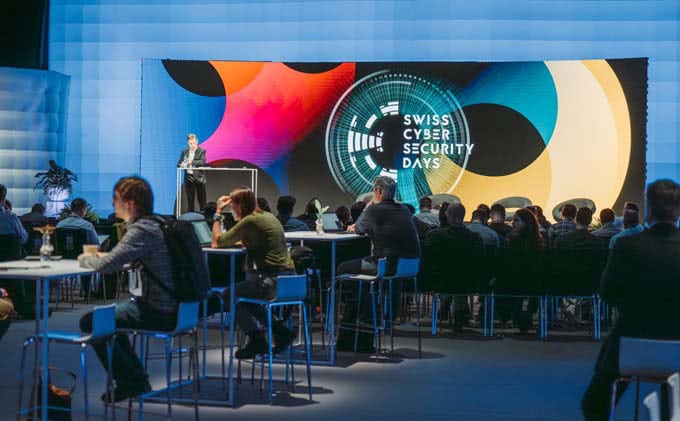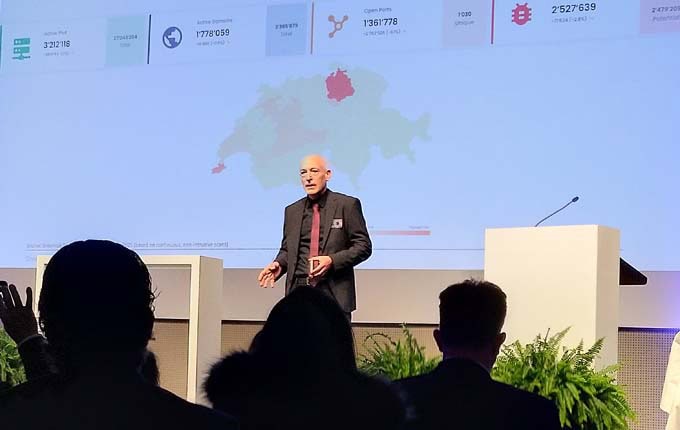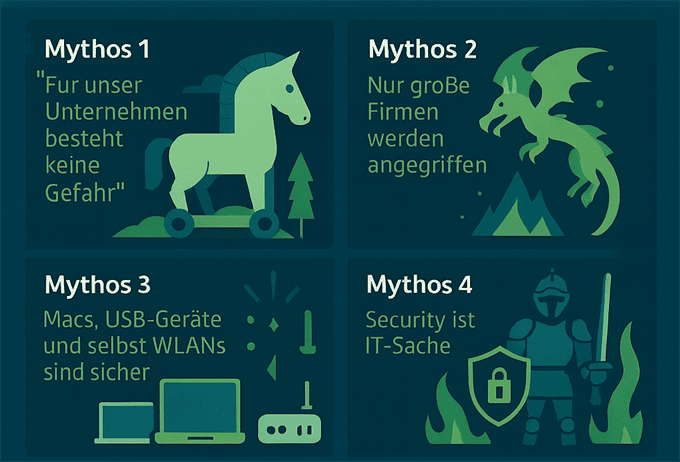SCSD 2025: Focus on quantum security and the protection of minors
The Swiss Cyber Security Days (SCSD) took place in Bern on February 18 and 19, 2025. This year's edition was held under the motto "Eye of the Cyber". An annual evaluation of the cyber security situation in Switzerland showed once again that there is still a lot of work to be done.

Some visitors may have left this year's Swiss Cyber Security Days with a queasy feeling: Are my passwords still secure? Can I still trust e-banking? And which Tinder profiles are real and which are fake? The threat situation has become even more diverse compared to previous years. Program Director Nicolas Mayencourt emphasized in his opening speech that the cyber security situation is alarming: "Technology is developing exponentially, our thinking is linear. We urgently need to act and boldly shape the digital future - a secure cyberspace and confident use of technology will become a decisive factor for success."
"Democratization" of new technologies
Jean-Marc Rickli from the Geneva Center for Security Policy, for example, underlined the fact that the use of technology is by no means as sovereign as it seems. He showed how the blessing of technological development can easily become a curse. 3D printing? A great thing for prototyping or the production of special components for industry. But also a way to quickly produce a functional weapon made of plastic that outwits any metal detector and can be easily disposed of "after use". Or equipping a drone with facial recognition software and unleashing it on an appropriately "personalized" target is also possible with comparatively little effort. In this way, warfare is no longer just a matter for armies.
Similarly in cyberspace: it is no longer just about phishing emails or other scams. AI is opening up new possibilities, especially for disinformation. The advances in so-called deep fakes are immense and are leading to increasingly unrestrained use - both by petty criminals and state institutions, as examples from the war in Ukraine or the conflict in the Gaza Strip show. Jean-Marc Rickli sees a major danger in the fact that people will ultimately no longer be able to trust any information. "The social contract between citizens and democracy is under threat," says the expert. "Weapons of mass destruction" would be replaced by "weapons of mass disinformation".
Better protection for children and young people
A rather dystopian world in which the younger generation also has to grow up. Regula Bernhard Hug, Head of the Swiss Child Protection Office, and Christian Brenzikofer, Commander of the KAPO Bern, stated at a media conference on site that children and young people are increasingly exposed to dangers in cyberspace. The increasing online addiction of young people, as well as the rising cases of sextortion and paedocrime, are of concern to the specialist unit and the authorities. "In the canton of Bern, the KAPO Bern deals with between 200 and 250 suspected cases of paedocrime," says Christian Brenzikofer. Major efforts to prevent and raise awareness of this issue remain important. Parents and schools are the most important partners in showing young people how to use online media responsibly. But it is also a task for society as a whole, as Regula Bernhard Hug emphasized. The manufacturers of devices and providers of social media portals must also be involved by setting up safety-by-design standards and data protection-compliant age verification. A general ban on social media for young people under the age of 16 would be the last resort.

Swiss cyberspace: still easily vulnerable
Another highlight of SCSD 2025 was the analysis of Switzerland's cyber security situation, carried out by Dreamlab Technologies. Every year, the company uses specially developed software to scan the infrastructure connected to the internet throughout Switzerland. This involves over 3.2 million ports, of which over 2 million are vulnerable and over one million ports are even open and could be misused without any special IT knowledge. Over 250,000 hosts also work without encrypted communication. There are therefore many critical vulnerabilities. "We are doing anything but well," as Nicolas Mayencourt and Prof. Dr. Marc K. Peter, who presented the results, found out. Government-related IT infrastructures are no exception, as the two explained. For example, there are still a number of weaknesses at the federal government that have been known for years but have not yet been eliminated. The high level of dependence on foreign providers is also problematic, which jeopardizes the government's own digital sovereignty. Overall, the cyber security situation in Switzerland is sobering. "Despite the tense general situation, no major improvements are discernible," Nicolas Mayencourt noted. This is all the more regrettable because 80% of the vulnerabilities could be avoided with simple measures. It also shows that although most SMEs are technically well on their way, there is still a lot of catching up to do in terms of organization. "Cybersecurity is a matter for the boss," says Mayencourt.
Encryption must now be quantum secure
Quantum computer technology poses a further threat to cyber security. The immensely faster computing power of quantum computers means that it will one day be possible to crack all conventional encryption. Experts assume that this moment, known as "Q Day", will take place in 2030. But regardless of this, all encryption systems used today will be obsolete by then anyway, because conventional computer technology will also become increasingly advanced. This means that future-proof encryption systems must be "quantum-proof" in any case. According to the analysis by Dreamlab Technologies, around 85% of servers in Switzerland could already guarantee quantum-safe communication today, but only around 10% are already actively doing so. The good news, however, is that Switzerland is playing a leading role in the development of new post-quantum cryptography standards. For example, the IBM research center in Rüschlikon played a key role in the development of new algorithms that can replace conventional 2048-bit encryption technology.
Satisfied exhibitors and organizers of SCSD 2025
In addition to these focus topics, the SCSD 2025 also had a number of other highlights: There were interesting insights from the Cyber Division of the FBI, for example, and the remarks by Corps Commander Thomas Süssli and panels on disinformation or radicalization on the Internet also met with great interest from the total of around 2,500 visitors. The interdisciplinary exhibition "Alternate Realities" was a novelty. This was realized in collaboration with the Museum of Communication, the gibb vocational school in Bern and the Bernese motion designers Kaspar Kilchenmann and Yan Hirschbühl and impressively showcased the creative possibilities of AI.
Overall, the 90 or so exhibitors and the organizer also drew a positive balance. The SCSD took place at the BERNEXPO site for the second time in a row and built on last year's success. "Especially in the current times, which are characterized by protectionist developments, the Swiss Cyber Security Days impressively demonstrate the importance of cooperation and exchange in order to meet the challenges of the digital world," said Tom Winter, CEO of BERNEXPO AG. Hornetsecurity, a leading provider of cyber threat solutions, took part as an exhibitor for the first time. Country Manager Switzerland, Roger Staub, speaks of a complete success: "With our product solutions, we were able to show how companies can comprehensively protect themselves against cyber threats. We are proud of the networking party, which created a great platform for professional exchange and new contacts. Our commitment to a more secure digital future continues - which is why we expect to be back at the SCSD in 2026." The next edition of the SCSD will take place on February 17 and 18, 2026.
Further information: www.scsd.ch









